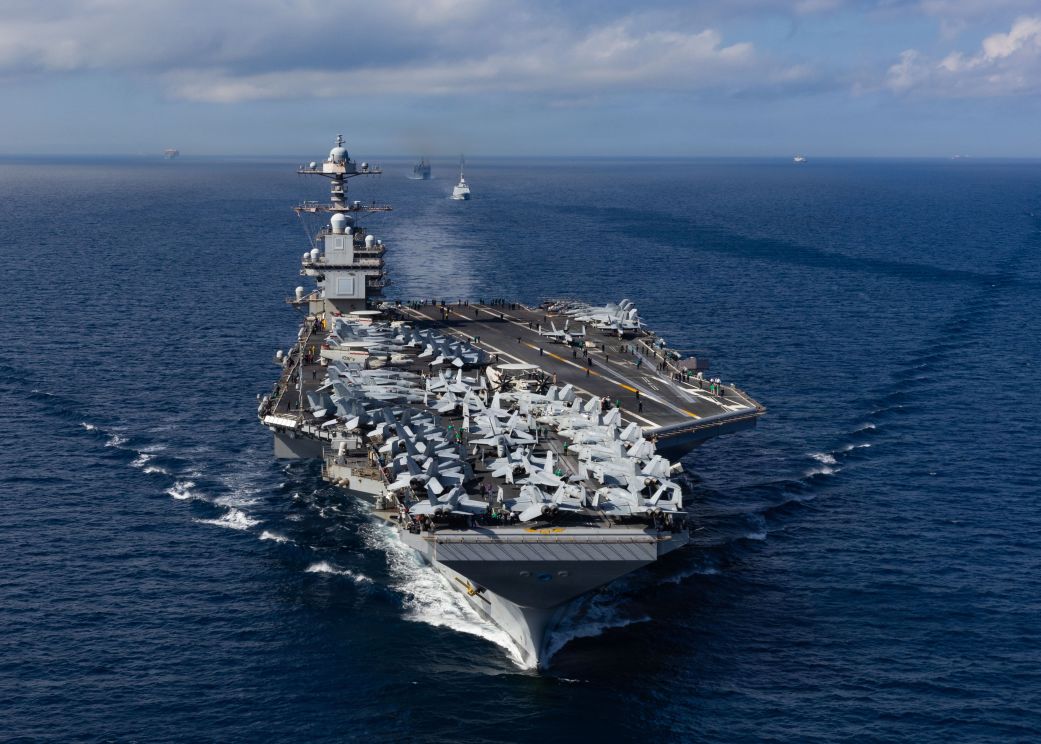The Return of U.S. Power Projection in Latin America
The deployment of the USS Gerald R. Ford to the Caribbean signals a dramatic new phase in the Trump administration’s approach to Latin America, which may well be part of the broader Trump Latin America strategy 2025. Officially, it’s a campaign to combat drug trafficking networks, but in practice, it represents a high-stakes show of force aimed at Venezuelan President Nicolás Maduro. Military analysts note that moving an entire carrier strike group from Europe to the Caribbean goes beyond mere deterrence — it suggests possible preparation for combat operations. The administration has labeled Maduro an “indicted trafficker,” tying his government to networks that supply fentanyl and cocaine. Yet data from the United Nations Office on Drugs and Crime indicates that Venezuela produces minimal quantities of these substances, compared to major routes through Mexico and Colombia. Still, the narrative of “narco-authoritarianism” provides political cover for Washington to escalate regional influence.
Trump’s foreign policy team describes this as part of a broader “hemispheric security initiative.” The effort aligns with America’s historical desire to dominate its strategic backyard — a revival of 20th-century interventionism repackaged in 21st-century populist terms. Within the Pentagon, sources confirm that advanced surveillance aircraft and maritime drones have already begun mapping suspected “cartel routes,” while Special Operations Command is training partner forces in Colombia and Panama.
A MAGA Doctrine in the Western Hemisphere
The Trump administration’s evolving Latin America strategy fuses nationalism, anti-communism, and economic leverage into what some have dubbed the “MAGA Doctrine.” Beyond Venezuela, Washington has tightened economic and political pressure on several countries seen as ideological adversaries or aligned with Beijing. Earlier this year, the White House proposed a multibillion-dollar economic cooperation package to Argentina, contingent upon President Javier Milei’s electoral success — a move that paid off when his pro-U.S. coalition secured a sweeping victory. Trump celebrated the outcome as proof of the MAGA movement’s international reach, signaling deeper engagement with right-wing populist allies across the continent.
Meanwhile, figures like Secretary of State Marco Rubio have revived rhetoric reminiscent of the Monroe Doctrine, warning that China’s growing influence in Latin America represents “the greatest threat to hemispheric sovereignty since the Cold War.” Rubio recently visited Panama to push for restrictions on Chinese control of infrastructure near the Panama Canal, citing national security concerns. The administration’s stance combines ideological loyalty tests with realpolitik goals — ensuring access to critical resources like oil and lithium, while countering Beijing’s Belt and Road investments.
Even as the U.S. wields sanctions, military deployments, and diplomacy, critics argue that the policy risks reviving patterns of regional dominance that destabilized the Americas in the past. Trump’s allies, however, frame it as a “restoration of American strength” after years of perceived neglect.
The Geopolitical Gamble: Venezuela, China, and Regional Realignment
Possible strikes on Venezuelan soil would ignite both constitutional and humanitarian debates in the United States. The U.S. Constitution grants Congress, not the president, the authority to declare war — yet Trump’s team insists that targeting “unlawful combatants” involved in narcotics trafficking requires no further authorization. Legal experts counter that this interpretation stretches executive power dangerously close to the limits of the War Powers Act.
Inside Venezuela, the stakes are even higher. Regime change could trigger instability across South America, threatening migration patterns and economic systems already under strain. Trump’s advisers argue that removing Maduro could open access to the nation’s vast oil reserves and allow U.S. energy companies to reenter the Venezuelan market — a critical move as Washington seeks to reduce dependence on Middle Eastern imports. Analysts warn, however, that the fallout could mirror disastrous interventions in Iraq and Libya, further eroding U.S. credibility abroad.
The strategic message to China and Russia is unmistakable: the Western Hemisphere remains under U.S. control. Both powers have deepened diplomatic ties with Caracas, investing heavily in energy and defense sectors. Trump’s aggressive posture risks turning Latin America into a new arena for great-power competition. If successful, the policy could restore U.S. influence lost over two decades. If not, it may entangle Washington in yet another prolonged and costly geopolitical standoff.
As the USS Gerald R. Ford approaches Venezuelan waters, one thing is clear: Trump’s second term is redefining the boundaries of U.S. foreign policy — blending hard power, populist ideology, and regional ambition into a single, combustible mix. Whether this bold gamble reshapes Latin America or plunges it into renewed turmoil remains to be seen.



